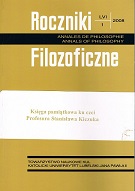Kosmologiczny kontekst formułowanych współcześnie argumentów teistycznych
The Cosmological Context of Currently Formulated Theistic Arguments
Author(s): Józef TurekSubject(s): Philosophy
Published by: Towarzystwo Naukowe KUL & Katolicki Uniwersytet Lubelski Jana Pawła II
Keywords: theistic arguments; cosmology; argumenty teistyczne; kosmologia
Summary/Abstract: In this article the most important theistic arguments formulated by virtue of the achievements of contemporary cosmology are presented and critically discussed. In general, these are the socalled aposterioric arguments, i.e. those that descend from commonly accepted scientific facts in cosmology. In view of these facts an attempt is made to show that a theistic explanation is the best one among all the possible ones. Taking into consideration the fundamental essence of cosmological data, two the most important genera of formulated arguments are pointed out. The first one refers to the Big Bang widely affirmed in cosmology. It assumes the shape of the previous argument from the beginning of the time of the Universe. The main difficulty of this argument is the fact of its groundless attribute of the Big Bang with the character of the absolute beginning of time forewent only by nothingness. The second genera of the argumentation refers to the so-called cosmic coincidences affirmed in cosmology. Depending on philosophical interpretations of these coincidences, one may speak about the argumentation from the plan, rationality, mathematicality, teleology, subtlety or contingency of the Universe. The cognitive value of these arguments on the one hand depends on the legitimacy of the interpretations of cosmic coincidences and on the other hand it depends on the possibility of demonstrating that the theistic interpretation of philosophically interpreted scientific facts is the best possible explanation. Because there is no easy way to demonstrate the validity and correctness of both ways of ratiocination, therefore the evidential strength of all these arguments evokes many questions.
Journal: Roczniki Filozoficzne
- Issue Year: 56/2008
- Issue No: 1
- Page Range: 295-313
- Page Count: 19
- Language: Polish

